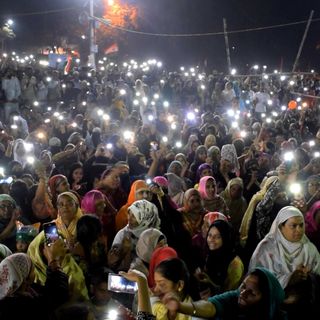It was Dec. 11, 2019, that changed Paromita Bardoloi forever. The 34-year-old writer based out of Delhi had gone home to her small town in Assam, Rupai Siding, to visit her family. Around 8 p.m., she watched parliamentarians pass the controversial Citizenship Amendment Act on the television. Almost immediately after, she watched the residents of her town take to the streets, “as if a death was declared,” Bardoloi says. “People sloganeered throughout the night. It was a cold, silent night in a sleepy town, when the night slept but we stayed awake.” From then on, every day, she witnessed everyone, from college kids to monks to old women, come out in droves for anti-CAA protests, asking the government to repeal the law.
For Bardoloi, it was as if her Assamese identity had awakened all over again. “When I went to the protest and sat with everyone doing satyagraha, I knew that I want to stay back. You don’t leave your land when it’s hurting,” she says. “This land has given each one of us so much, which we carried everywhere. But this time, it’s the land that needs us. So, I stayed back. I don’t know for how long this will continue. But till I can, I will stay here.”
It is for Assamese pride that Bardoloi says she supported the National Register of Citizens when it was first implemented in Assam. She says the state infrastructure was crumbling under the burden of accommodating Bangladeshi migrants. At the same time, many around her felt Assamese culture would slowly be erased. “In Assam, we are fighting for our self-preservation. We can’t accept more people as we are so resource-scarce already. It’s a direct threat to our culture and identity.” Bardoloi, however, eventually understood the threats the NRC posed, as it expects people without documents to show up and prove their citizenship. As for the anti-CAA protests, she says she has unique reasons to oppose the Act — it’s not because it’s unconstitutional or biased against Muslim migrants; it’s because it’s anti-indigenous, she says, and puts the Assamese people and Assamese identity at risk from all migrants from neighboring countries.
For Bardoloi, leaving her life in Delhi to indefinitely protest with Assam has been both a political and personal renaissance.
Related on The Swaddle:
Little Big Things: The 78-Year-Old Grandmother Learning to Use a Smartphone
Bardoloi’s political awakening happened during the protests that succeeded the 2012 Delhi gang rape in Delhi, when she realized her existence as a woman was inherently political. Growing up, she had read Assamese literature and spoken the language, but after she realized the looming threat of the NRC-CAA, she realized her existence as a native of Assam was also political. In her time protesting against the CAA with her statespeople, Bardoloi has realized how her ancestors toiled so she could be proud of her Assamese identity. In the languages spoken by more than 200 tribes in the state, in the gamusa (traditional piece of cloth) donned by protesters in the street, in the women who climbed onto trucks to protest without hesitation, Bardoloi saw the work past activists had put in to make the Assamese identity one of the more liberal ones found in India. “It hasn’t come for free,” she says. “Through all this, you realize that to become the woman you are today, a history is attached to it — a history that has an immense diversity of culture.”
“In these protests, people from all classes and backgrounds come. I speak to everyone. Some come with children, some come with neighbors. But everyone tries to add to the protest. I met women who work in tea gardens. They are everyday wage workers. Each day they earn Rs. 167. And each day they come to protest they lose money. Still, they come,” Bardoloi recounts. “You come to see that the land we sit on unites each one of us. And how that love, that belongingness brings us all together.”
For Bardoloi, “to care is to belong, to be bigger than your own small self.” She says she still has to return to Delhi at some point, to resume her life. But for now, staying home is “the right thing to do.”




